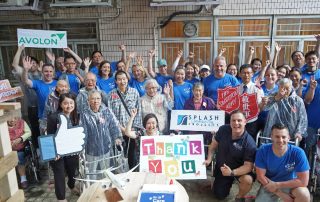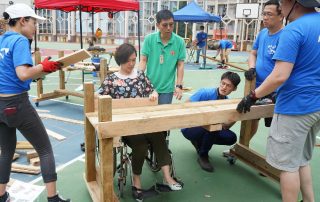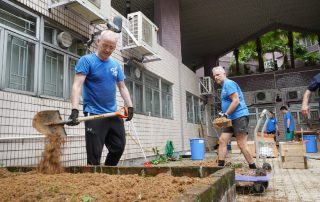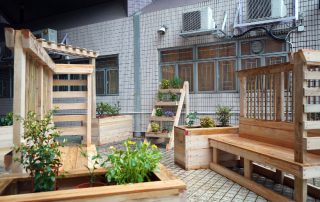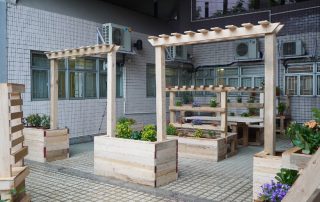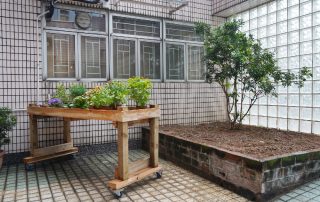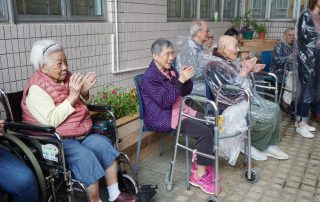As the elderly population continues to grow, the needs and views of senior citizens are important to the Hong Kong Special Administrative Region (HKSAR) Government. The coming election of the HKSAR Chief Executive offers an opportunity for the senior citizens served by The Salvation Army to reflect their opinions. Therefore, a press conference was held today (17 March 2017) to announce the nine priority concerns of the elderly people to be addressed by the Chief Executive candidates.
The Salvation Army continually cares for people in need and employs its influence at every level of society and government so as to transform their lives. In December 2016, the Army’s Joint Committee for Senior Citizens conducted the project “Users’ Views on Age-friendly Policy Measures for Candidates of HKSAR Chief Executive”. By the end of January 2017, a total of 1,429 elderly people participated in an opinion poll. Based on the eight topic areas of “Age-friendly City of World Health Organization” and the issue of retirement protection, the participating elders selected the top nine areas of concern which are expected to be addressed by the new-term Government.
Users’ View
1. Housing: Provide more residential places of subvented homes
2. Social participation: Increase the number of elderly centres to provide easier access to elderly services
3. Respect and social inclusion: The Government should take a leading role to promote respect and social inclusion to the elderly when making elderly related policies
4. Civic participation and employment: Extend the retirement age and retain the young-old in the labour market
5. Communication and information exchange: Increase the number of elderly centres as a platform to help senior citizens effectively acquire information
6. Transportation: Strengthen the training of public transport drivers to deepen their understanding of the elders’ needs for them to provide support to the elderly on their journeys
7. Outdoor spaces and buildings: Increase the number of road safety facilities to ensure the safety of elderly road users
8. Community support and health services: Increase medical resources and manpower of public hospitals, so as to improve service quality and patient wait times.
9. Retirement protection: Elders shall enjoy the basic right to a non-means tested retirement protection scheme.
Case: Elders Affected by Chronic Disease (community and health services)
Ms Ho Kong-kei, aged 68, mainly relies on her own savings for living. In October 2016, she had fallen over twice and injured the bones of her knees. With doctor’s referral, she sought specialist treatments. However, her consultation appointment date in public hospital was arranged to be 1 November 2019. The pain was too unbearable that she went to see a Chinese bone-setter, planning to receive five times of treatment at a cost of $300 each. Due to financial difficulty, she only received the treatment twice and bought over-the-counter medicated oil to relieve her pain.
Ms Ho hopes that the government will increase medical resources to improve the services of public hospitals, reduce the patient waiting time for specialist treatment, or even let patients receive medical assessments upon presentation of a doctor’s referral letter.
Case: Elders Living Alone (retirement protection)
Ms Ho Lai-bing, aged 86, is living in an old apartment in Yaumatei. The job of selling dim sum in a restaurant and the medical expenses on her late husband made her savings limited. Currently, she relies on the government’s Old Age Living Allowance which is about $2,000 per month and her meager savings. To cope with daily expenses, she leads a frugal life. She goes to the market just before it closes and takes a long walk to the market in Mongkok to buy cheaper food. For social and leisure activities, she always participates in the low-cost and free ones organised by elderly centres but rarely joins the outdoor activities with a higher fee. Ms Ho hopes that the government will launch a non-means tested retirement protection scheme so that the elderly need not worry about their daily expenses.
About The Salvation Army Joint Committee for Senior Citizens
Since 1970s, The Salvation Army has been fostering mutual help among the elderly and raising their attention to the elderly policies, so as to strengthen their role and participation in society. The Salvation Army Joint Committee for Senior Citizens is a voluntary group formed by the elected members of The Salvation Army Elder Committees and representatives of Salvation Army elderly service units/ groups.
The Committee helps to strengthen the connection between different Elder Committees and the development of the committee members. The Committee, as one of the active elderly groups, is concerned about social policies related to the elderly and helps to reflect the elders’ opinions.



